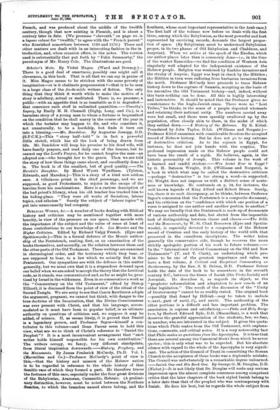Scholar's Mate. By Violet Magee. (Ward and Downey.)— There is
a good deal of smartness, possibly one might call it cleverness, in this book. That is all that we can say in praise of it. Miss Magee seems to be stricken with the same poverty of imagination—or is it obstinate prepossession ?—that is to be seen in a large class of the fin-de-sidcle writers of fiction. The only thing that they think it worth while to make the motive of a story is adultery, actual or meditated. There is, we presume, a public—with an appetite that is as insatiable as it is degraded— that consumes such stuff in unlimited quantities.—Timothy's Legacy, by Emily M. H. Clennell (Digby, Long, and Co.), is a harmless story of a young man to whom a fortune is bequeathed on the condition that he shall marry in the course of the year in which the testator may happen to die, and who considers it, not unnaturally, to be a hardship, but finds it turn out into a blessing.—Mr. Dandelow. By Augustus Jessopp, D.D. (S.P.C.K.)—This " story half - told " is in fact a powerful little sketch, which has all the look of being drawn from life. Mr. Dandelow will keep his promise to his dead wife, will have family prayers, and read daily one of the lessons, but he cannot say the Lord's Prayer, for he cannot forgive the man—an adopted son—who brought her to the grave. Then we are told the story of how these things came about, and excellently done it is. The book is of the smallest, but of good quality.—The Heretic's Daughter. By Maud Wyett Wyndham. (Tylston, Edwards, and Marsden.)—This is a story of a kind now seldom seen. A villainous priest is the chief personage, and we are supposed, as good Protestants, to rejoice in the escape of the heroine from his machinations. Here is a curious description of the bad priest's library, when his old teacher has tracked him to his hiding-place. "They were all works of Socialism, labour topics, and atheism " Surely the subject of "labour topics" is put into unnecessarily bad company.
















































 Previous page
Previous page